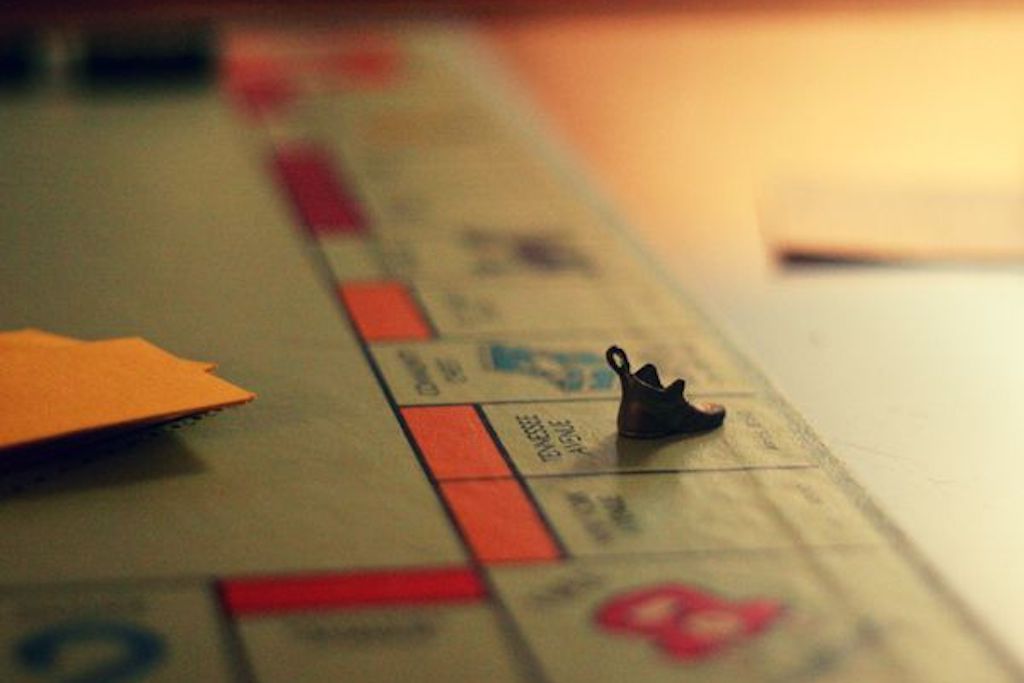All the worst things about games at camp I learned from Monopoly (part 2)

This is part 2 of a series of blog posts based on a presentation that I’ll be doing for SCampCon 3 on February 11, 2021. More info: summercampcon.com
As I mentioned in the previous post, Monopoly isn’t a bad game if played by the rules as written. The problem is that many of us learned to play the game, not by reading the rules, but from a relative or a friend teaching us. Several house rules have been passed down over the years that have given the game a bad reputation. Some of the problematic aspects of the game also show up in the camp games that we play, and this series uses these aspects as prompts for looking critically at our camp games and offering suggestions on how to improve them. This time we look at choices (or the lack thereof) in the game.
The thing about Monopoly is that it features too much randomness and not enough player agency.
Problem #2: The Game Plays the Players
Monopoly can sometimes feel like it is won or lost based on the dice rolls and the card draws. A game’s outcome can feel that it’s based more on luck than on decisions. For some players, randomness can feel like a feature. It’s exciting to roll dice and draw random cards. And perhaps this is why Monopoly is such a well-loved game by casual gamers and families. The randomness makes it possible for the inexperienced child to beat the seasoned adult because the dice fell the child’s way. The problem is, these positions can easily be reversed, and too often it feels like the game plays the players rather than the other way around.
Over the years, several of our camp games have featured randomness to determine their outcomes. We’ve used dice rolls, wheel spins, card draws, random number generators, and more in our games to create a sense of excitement and luck. Too often, these mechanisms left players feeling like they had little agency in controlling the outcome of the game. While having some random elements in the game can add excitement and variety, giving players control of the outcome helps them see they aren’t just bound to fate.
Let’s take a moment to talk about randomness. Keith Burgun has written extensively about randomness in games.1 In summary, there are two types of randomness: output & input. Output randomness is what we typically think about in games. A player makes a decision, and a random element (like a dice roll, card draw, etc.) determines the outcome of that decision. For me, the game Risk is a classic illustration of output randomness. One player decides to attack another player’s area. They both roll dice to determine the outcome. Input randomness, on the other hand, produces random elements or situations to start with from which the players make choices. For example, in Scrabble, players draw letter tiles randomly from a bag. From there, they need to decide how they want to use the letters to form words on the board. Players have more agency in determining the outcome of the game with input randomness.
How does this apply to camp games?
Good camp games create ways for players to make meaningful decisions.
Player agency is golden. Move away from solely utilizing output randomness (“Is it behind door #1, #2, or #3?”, “Can you roll a 5 or 6 to win?”, “Do you call heads or tails?”, etc.) and toward input randomness in your camp games. Find ways to present a few choices to campers so they can make meaningful decisions. For example, a feature of “carnival-type” events at our camps is to give players choices on how to spend tokens earned by winning fast-paced games. They can redeem tokens for team points, spend them to block an opposing leader, or spend them for an instant-gratification type of treat. During these events, campers are “randomly” winning tokens through various activities, but how they use them to win the game for their team is up to them. One word of caution on adding choices: it is possible to present too many of them to players and induce “analysis paralysis,” so keep the number of options limited.
In summary, randomness in small doses can add excitement to a game and make it possible for a beginning player to win; however too much randomness (especially output randomness) can create an experience that feels like the game plays the players and not the other way around. Finding ways to implement input randomness can give players more agency, thus feeling more in control of the outcome of the game.
Coming up next – (Part 3) The thing about Monopoly is that it’s won only when everyone else has been eliminated
1 For more details about input vs. output randomness, Check out Keith Burgun’s blog post HERE and a video explanation of these concepts HERE